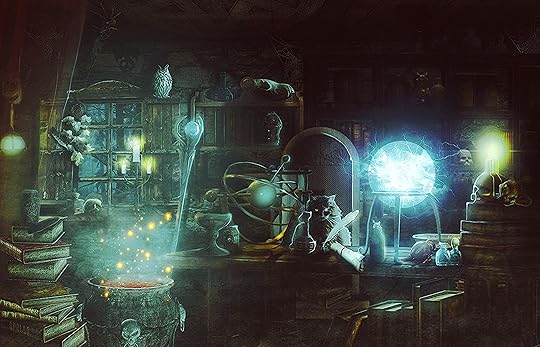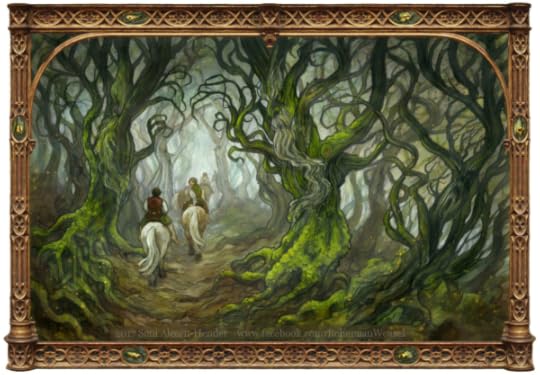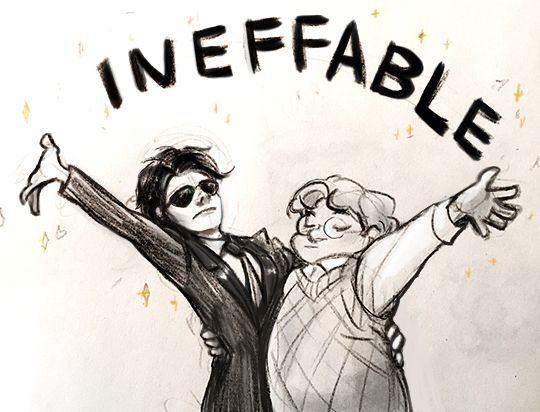Juho Pohjalainen's Blog: Pankarp - Posts Tagged "pet-peeves"
Rule Number One of Magic: There Are No Rules
Or to be perhaps a little less blunt and poetic... the rules for magic come from within, not without.

Great many fantasy writers, especially nowadays, love to develop complex magic systems, fancy and impressive and well-explained, spending a lot of time and pages to describe the way the wizard tosses the runestones or sings the song or speaks the true name or what have you. And I never saw the point in this sort of a thing: it may seem like an attractive course of action on the surface, to flesh out and expand the most magical and fantastic thing in your world, to show the reader just how things work there and how it's different from our own mundane life... but what you're really doing is, you're wasting a great deal of time and effort and the reader's attention to make your world less magical.
You're taking things that should be Unknown, and making them Known. You're turning the Magic into Science: the kind of science that's quite impossible for us in real life to do, but science nonetheless. From the narrative standpoint, what really is the difference between tapping into the energies of the Wyrd (or whatever) that exists parallel to your world and that all magic is fueled by, then wriggling your fingers the right way, snapping your thumb and forefinger to create the spark, in order to cast the Fireball spell to burn your enemies – and pulling the trigger of your flamethrower to shoot the fuel out through the burning nozzle?

There is no difference.
This was a fairly exaggerated example, many of the magic systems rarely true to such extent, but you get the point. Each fact established about magic as a whole – where the magical energy comes from, whether wizards throw down runes or play music or whatever to create effects with it, how different runes or instruments or what have you play off of one another, etc. – binds it more and more to common reality, dulls out the fantasy and wonder, makes it more logical and understandable and predictable, cages it. Magic should fly free.
So, I avoid making such generalizations to the last: I never tell how all magic everywhere works. Instead, I tell how this one guy's magic works. This has numerous advantages for me:
First, I tend to enjoy character-based stories, rather than setting-based, so this keeps the priorities in the correct order. To develop some character's inidividual magical style, is to develop the character.
Second, it maintains the sense of wonder. You may know how this guy works his magic, but you have no idea how the next guy does it: each time you meet another wizard you'll have something to look forward to.
Third, it still binds them to the narrative with personal rules and limitations. To take the above Fireball example, one wizard may cast it with a wand made out of specific kind of wood, with specific kind of runes written in it; another one might cast it by yelling out a Sick Burn. If you want to defend yourself against the former guy, or to add narrative tension about his survival, snap his wand; to do the same for the latter, gag him.
You see a demonstration of this early on in The Straggler's Mask, where two wizards take out their wands and commit to a terrible and destructive arcane duel. Their different philosophies and powers are at the forefront the entire time:

(Incidentally, I'm really not a fan of how so much of magic art is so full of flash and color and lightning and other special effects. But that's a blog post for another day.)
The old man Melker has spent all his long life in formal theoretical study of the arcane, learning his art slowly and methodically from scrolls, grimoires, and sorcerers even older and wiser than himself. A common magic system is to attribute magic to a language, but here we take this approach to the extreme: to such logical and methodical sorcerers, every individual spell is a language of their own. You don't just learn the language of magic in general. You learn the language of Fireball. And you better learn it well before starting to fling the spell around, or else you might embarrass yourself by casting something stupid, and you'll always have an accent no matter what you do. (Going with this method, Ziad Fazah would be a legendary archmage!) Melker may have only a few spells, but he's had a long time to become fluent with each of them, casting them with practiced and precise competence and surprising flexibility.
The demonic witch-girl Rime, on the other hand, has no patience for such bullshit, and instead learned her art from the lips of demons and spirits. Their whispers don't involve much about the nitty-gritty details of whatever spells they taught her, rather just how to get things done quickly and efficiently. She is consequently extremely powerful for her age, having learned a lot of things very fast... but not necessarily very well. Virtually all of her magic comes with a heavy cost, whether material or spiritual or physical, or risk doing great deal more harm to her surroundings than she'd wish it to, or involve constantly maintained pacts and complex diplomacy with summoned demons and monsters. She wields it all with relentless, burning rage – she is at a constant risk of being destroyed by things she doesn't understand, but she's going to take a chunk of the world with her.
And they are only two. You can bet that every other wizard in the setting will have their own way of doing things. None of them truly know where the magic comes from, if indeed it all comes from the same place at all – some of them have theories, beliefs, but I'll never make the mistake of telling you which one is right.
There is one constant rule, I suppose, but it's not really a rule with magic as with everything in this world or theirs: all knowledge or power worth possessing is going to take a great deal of effort, time, or other cost to acquire. If you feel that something came too easy for you, then odds are good you haven't truly acquired it, and that it's going to do you far more harm than good.


Great many fantasy writers, especially nowadays, love to develop complex magic systems, fancy and impressive and well-explained, spending a lot of time and pages to describe the way the wizard tosses the runestones or sings the song or speaks the true name or what have you. And I never saw the point in this sort of a thing: it may seem like an attractive course of action on the surface, to flesh out and expand the most magical and fantastic thing in your world, to show the reader just how things work there and how it's different from our own mundane life... but what you're really doing is, you're wasting a great deal of time and effort and the reader's attention to make your world less magical.
You're taking things that should be Unknown, and making them Known. You're turning the Magic into Science: the kind of science that's quite impossible for us in real life to do, but science nonetheless. From the narrative standpoint, what really is the difference between tapping into the energies of the Wyrd (or whatever) that exists parallel to your world and that all magic is fueled by, then wriggling your fingers the right way, snapping your thumb and forefinger to create the spark, in order to cast the Fireball spell to burn your enemies – and pulling the trigger of your flamethrower to shoot the fuel out through the burning nozzle?

There is no difference.
This was a fairly exaggerated example, many of the magic systems rarely true to such extent, but you get the point. Each fact established about magic as a whole – where the magical energy comes from, whether wizards throw down runes or play music or whatever to create effects with it, how different runes or instruments or what have you play off of one another, etc. – binds it more and more to common reality, dulls out the fantasy and wonder, makes it more logical and understandable and predictable, cages it. Magic should fly free.
So, I avoid making such generalizations to the last: I never tell how all magic everywhere works. Instead, I tell how this one guy's magic works. This has numerous advantages for me:
First, I tend to enjoy character-based stories, rather than setting-based, so this keeps the priorities in the correct order. To develop some character's inidividual magical style, is to develop the character.
Second, it maintains the sense of wonder. You may know how this guy works his magic, but you have no idea how the next guy does it: each time you meet another wizard you'll have something to look forward to.
Third, it still binds them to the narrative with personal rules and limitations. To take the above Fireball example, one wizard may cast it with a wand made out of specific kind of wood, with specific kind of runes written in it; another one might cast it by yelling out a Sick Burn. If you want to defend yourself against the former guy, or to add narrative tension about his survival, snap his wand; to do the same for the latter, gag him.
You see a demonstration of this early on in The Straggler's Mask, where two wizards take out their wands and commit to a terrible and destructive arcane duel. Their different philosophies and powers are at the forefront the entire time:

(Incidentally, I'm really not a fan of how so much of magic art is so full of flash and color and lightning and other special effects. But that's a blog post for another day.)
The old man Melker has spent all his long life in formal theoretical study of the arcane, learning his art slowly and methodically from scrolls, grimoires, and sorcerers even older and wiser than himself. A common magic system is to attribute magic to a language, but here we take this approach to the extreme: to such logical and methodical sorcerers, every individual spell is a language of their own. You don't just learn the language of magic in general. You learn the language of Fireball. And you better learn it well before starting to fling the spell around, or else you might embarrass yourself by casting something stupid, and you'll always have an accent no matter what you do. (Going with this method, Ziad Fazah would be a legendary archmage!) Melker may have only a few spells, but he's had a long time to become fluent with each of them, casting them with practiced and precise competence and surprising flexibility.
The demonic witch-girl Rime, on the other hand, has no patience for such bullshit, and instead learned her art from the lips of demons and spirits. Their whispers don't involve much about the nitty-gritty details of whatever spells they taught her, rather just how to get things done quickly and efficiently. She is consequently extremely powerful for her age, having learned a lot of things very fast... but not necessarily very well. Virtually all of her magic comes with a heavy cost, whether material or spiritual or physical, or risk doing great deal more harm to her surroundings than she'd wish it to, or involve constantly maintained pacts and complex diplomacy with summoned demons and monsters. She wields it all with relentless, burning rage – she is at a constant risk of being destroyed by things she doesn't understand, but she's going to take a chunk of the world with her.
And they are only two. You can bet that every other wizard in the setting will have their own way of doing things. None of them truly know where the magic comes from, if indeed it all comes from the same place at all – some of them have theories, beliefs, but I'll never make the mistake of telling you which one is right.
There is one constant rule, I suppose, but it's not really a rule with magic as with everything in this world or theirs: all knowledge or power worth possessing is going to take a great deal of effort, time, or other cost to acquire. If you feel that something came too easy for you, then odds are good you haven't truly acquired it, and that it's going to do you far more harm than good.

Published on June 08, 2019 16:22
•
Tags:
magic, magic-systems, melker, overdesigning, pet-peeves, rime, rules, science, wizards, worldbuilding
Rule Number Two of Magic: Plenty Magic, Few Wizards
A human mind has always longed to make sense of things - to understand, to quantify, and to bind and take advantage of... or to get rid of what cannot be understood, to destroy or subjugate that which we fear.

For the last generation or so, this sort of thinking has been in vogue in fantasy as well. We now have great many stories where magic is fully understood, wizardry is a common and accepted profession, and fantasy creatures and weird races walk among us; or where all that nonsense has been shunted aside in favour of gritty medieval realism. On the internet message boards - particularly Tumblr - people love to discuss magic and monsters and such things, wonder how exactly they work, seek out loopholes in their behavior and new strengths and weaknesses, or have a good laugh about what happens when their rules are applied to reality in new and ridiculous ways.
For example...

Even that last aspect, about destruction and domination, has found new life in a subgenre called HFY - short for "Humanity Fuck Yeah" - which started out as an attempt to give humans something to be special about in the face of all the aliens and monsters, rather than being the generic Normals, but which many have chosen to interpret as humanity applying their science, intellect, and combat instinct to destroy all the fantastic and weird.

It's not just a yearning to understand, really - it all works in concert with an almost-equal yearning to explain. To show off, to feel smarter than those around us. To describe in great detail how our magic systems work, how well they make sense, and how we've integrated other creatures and monsters and races into the world and how they would change things in society; or, at the opposite end, how much research we've done on the subject of medieval history, technology, sociology, heraldry, and mud. Hell, I myself am far from immune to this: I make one atypical cosmic system and ensuing seasons and weather patterns, and I now find myself wanting to talk about it in every story I write.
I think it all shows an even greater issue we as a species have: when we get an idea that's ostensibly good or beneficial or funny, we exploit the shit out of it. More often than not this results in far more trouble than its worth. We cannot do anything in moderation. As seen here: we want to make sense of stuff, and so we kill fantasy.
Well, it's a slight exaggeration. It's not to say that any such fiction could not be pretty great anyway, or that some of the internet fantasy analyzation isn't really funny and making some curious remarks - it's just that I don't think we should follow such a trend too far, as a general rule, and that we should give a new chance to not understanding everything, and to let the world's own strange logic to carry things for us.
So as I like to do things, there's a lot of magic out there, a lot of fantasy, a lot of mystery - and there's nothing you understand about it on the outset, and very little you understand even after you've had an adventure. Wizards are rare and few, considered powerful and sagacious even when they're relatively weak or ignorant by the standards of most fantasy - each as well-known as kings, and no more common, yet each has only ever glimpsed a little bit of the unknown realm of fantasy. Other races live far away from human realms, at best mysterious and detached in the borderlands where they're sometimes seen, at worst unseen and wondrous, relegated to realm of imagination and fairytale, in the inner lands. The very world, its lands and seas and skies, acts bizarrely and erratically, all too often impossible to predict or defend against, let alone control. The people who have gone to these lands of wonder and returned alive, are venerated by all.
In your little farm, village, or town, things may - indeed should - seem altogether normal and sensible, your immediate surroundings well understood to you and no longer causing you fear... but step out of your door and onto the forest path, and who knows where it will take you and what strange sights will open to you.
That, as I understand it, is Fantasy.


For the last generation or so, this sort of thinking has been in vogue in fantasy as well. We now have great many stories where magic is fully understood, wizardry is a common and accepted profession, and fantasy creatures and weird races walk among us; or where all that nonsense has been shunted aside in favour of gritty medieval realism. On the internet message boards - particularly Tumblr - people love to discuss magic and monsters and such things, wonder how exactly they work, seek out loopholes in their behavior and new strengths and weaknesses, or have a good laugh about what happens when their rules are applied to reality in new and ridiculous ways.
For example...

Even that last aspect, about destruction and domination, has found new life in a subgenre called HFY - short for "Humanity Fuck Yeah" - which started out as an attempt to give humans something to be special about in the face of all the aliens and monsters, rather than being the generic Normals, but which many have chosen to interpret as humanity applying their science, intellect, and combat instinct to destroy all the fantastic and weird.

It's not just a yearning to understand, really - it all works in concert with an almost-equal yearning to explain. To show off, to feel smarter than those around us. To describe in great detail how our magic systems work, how well they make sense, and how we've integrated other creatures and monsters and races into the world and how they would change things in society; or, at the opposite end, how much research we've done on the subject of medieval history, technology, sociology, heraldry, and mud. Hell, I myself am far from immune to this: I make one atypical cosmic system and ensuing seasons and weather patterns, and I now find myself wanting to talk about it in every story I write.
I think it all shows an even greater issue we as a species have: when we get an idea that's ostensibly good or beneficial or funny, we exploit the shit out of it. More often than not this results in far more trouble than its worth. We cannot do anything in moderation. As seen here: we want to make sense of stuff, and so we kill fantasy.
Well, it's a slight exaggeration. It's not to say that any such fiction could not be pretty great anyway, or that some of the internet fantasy analyzation isn't really funny and making some curious remarks - it's just that I don't think we should follow such a trend too far, as a general rule, and that we should give a new chance to not understanding everything, and to let the world's own strange logic to carry things for us.
So as I like to do things, there's a lot of magic out there, a lot of fantasy, a lot of mystery - and there's nothing you understand about it on the outset, and very little you understand even after you've had an adventure. Wizards are rare and few, considered powerful and sagacious even when they're relatively weak or ignorant by the standards of most fantasy - each as well-known as kings, and no more common, yet each has only ever glimpsed a little bit of the unknown realm of fantasy. Other races live far away from human realms, at best mysterious and detached in the borderlands where they're sometimes seen, at worst unseen and wondrous, relegated to realm of imagination and fairytale, in the inner lands. The very world, its lands and seas and skies, acts bizarrely and erratically, all too often impossible to predict or defend against, let alone control. The people who have gone to these lands of wonder and returned alive, are venerated by all.
In your little farm, village, or town, things may - indeed should - seem altogether normal and sensible, your immediate surroundings well understood to you and no longer causing you fear... but step out of your door and onto the forest path, and who knows where it will take you and what strange sights will open to you.
That, as I understand it, is Fantasy.

Published on June 20, 2019 10:07
•
Tags:
creatures, fairy-tales, fantasy, humanity, instinct, magic, magic-systems, pet-peeves, rules, science, wizards, worldbuilding
Wildcard Rule of Magic: Careful with Christ
First noticing with King of Elfland's Daughter, now reaffirmed by The Broken Sword, I think this is worth noting down: you could make magic as whimsical and unknowable as it gets and I might still judge it too harshly - all thanks to our good Judean boy.

It'd be something of an addendum to the first rule, I suppose, about sciences and analyzing and quantifying, about the universe around us imposing itself to the sorcerer. It's not a hard-and-fast type of rule magic like Alchemy or Allomancy or what have you, though - it's more of an underlying implication underneath, an invisible rot that sets out to put all fantasy into decay.
Faith magic can on its own be as mysterious and unknowable, as wondrous and fantastic, as-

-as the best magic system out there... but at the end of the day, it all still relies on the premise of one true God, the creator of the world, the high being, omnipotent and omnipresent and omnieverything. The child outside the sandbox. And this being, by its very definition, always stands superior. Any other type of magic and monsters and fantasy will have their roots on pagan gods or outright devil worship, will always lose in the end - and is but an inferior shadow of the true path, trickery and lies, foolish, childish even. This kills a lot of the appeal for me.
Many other old faiths of the world - Hinduism, Greek and Norse Pantheons, etc. - don't have this issue, on account of the more polytheic nature and their capability of coexisting peacefully. They each have their version of the story of Earth's birth, how it all came to being, and you're free to come to your own conclusion and sacrifice to whichever daity you like. But Yahweh is a jealous one, and suffers no other gods or truths.

With brutal efficiency, He and His disciples set out to the world to reshape it all in their image. Pan, Loki, and Perkele, among many others - once perfectly fine and respectable deities - ended up as nothing more than an aspect of Lucifer Morningstar. Others, such as Brigid, were reduced in power to Saints, each subservient to the Lord. He is the one above all, and so His magic is above all other magic and fantasy.
Both Elfland's Daughter and Broken Sword seem to be taking this for granted. C.S. Lewis sinks deep into the same pitfall by his heavy use of allegory. Even the Vertigo line of comic books holds this as a truth, though it has other sets of gods as well. Other works can avoid the trap, but they'd typically have to go out on their way to establish Christianity as just another belief among the others, no inherently better or more truthful: the automatic assumption seems to be that if Jesus and God are out there, then they're the best and the highest. Watch yourself among them.

The Broken Sword is still a great book, though.

It'd be something of an addendum to the first rule, I suppose, about sciences and analyzing and quantifying, about the universe around us imposing itself to the sorcerer. It's not a hard-and-fast type of rule magic like Alchemy or Allomancy or what have you, though - it's more of an underlying implication underneath, an invisible rot that sets out to put all fantasy into decay.
Faith magic can on its own be as mysterious and unknowable, as wondrous and fantastic, as-

-as the best magic system out there... but at the end of the day, it all still relies on the premise of one true God, the creator of the world, the high being, omnipotent and omnipresent and omnieverything. The child outside the sandbox. And this being, by its very definition, always stands superior. Any other type of magic and monsters and fantasy will have their roots on pagan gods or outright devil worship, will always lose in the end - and is but an inferior shadow of the true path, trickery and lies, foolish, childish even. This kills a lot of the appeal for me.
Many other old faiths of the world - Hinduism, Greek and Norse Pantheons, etc. - don't have this issue, on account of the more polytheic nature and their capability of coexisting peacefully. They each have their version of the story of Earth's birth, how it all came to being, and you're free to come to your own conclusion and sacrifice to whichever daity you like. But Yahweh is a jealous one, and suffers no other gods or truths.

With brutal efficiency, He and His disciples set out to the world to reshape it all in their image. Pan, Loki, and Perkele, among many others - once perfectly fine and respectable deities - ended up as nothing more than an aspect of Lucifer Morningstar. Others, such as Brigid, were reduced in power to Saints, each subservient to the Lord. He is the one above all, and so His magic is above all other magic and fantasy.
Both Elfland's Daughter and Broken Sword seem to be taking this for granted. C.S. Lewis sinks deep into the same pitfall by his heavy use of allegory. Even the Vertigo line of comic books holds this as a truth, though it has other sets of gods as well. Other works can avoid the trap, but they'd typically have to go out on their way to establish Christianity as just another belief among the others, no inherently better or more truthful: the automatic assumption seems to be that if Jesus and God are out there, then they're the best and the highest. Watch yourself among them.

The Broken Sword is still a great book, though.
Published on July 11, 2019 10:48
•
Tags:
christianity, human-condition, magic, magic-systems, pet-peeves, philosophy, religion, tribalism
Pankarp
Pages fallen out of Straggler's journal, and others.
Pages fallen out of Straggler's journal, and others.
...more
- Juho Pohjalainen's profile
- 349 followers



